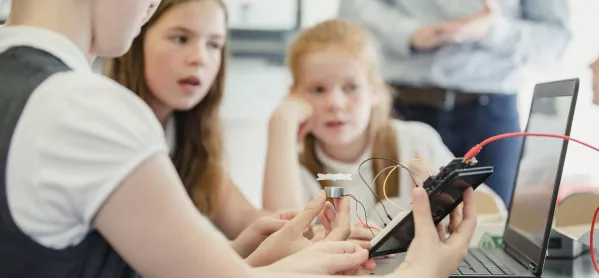It is vital that we inspire more girls to take computing science. But to do this, we need to start exciting girls and young women about technology subjects as early as possible.
The longer you wait to introduce pupils to tech, the harder it is to get them excited about it. Whereas if you get them engaged and excited at the start of secondary school - or even earlier - they realise just how much fun it can be and are more likely to stick with it.
In Scotland, however, the proportion of girls taking computer-related studies at National 3-5 dropped from 32 per cent in 2012 to 18 per cent in 2018. Meanwhile, only 16 per cent of students currently pursuing computing degrees at university are female.
Exam results 2019: Why computing exam entries have dropped
School computing: ‘An unfocused mess’
Computing in primary schools: Teachers ‘get away’ with not teaching computing
The Stem gender divide: ‘No real progress made’
Teacher recruitment: Are we getting the Stem teachers we need?
These numbers are transferring to the digital-technologies industry, where women currently hold only 23 per cent of skilled roles. In other words, the forecast is not bright when it comes to rectifying the gender imbalance in tech.
Computing science: the gender imbalance
I feel more needs to be done to raise the profile of the subject, and this is where organisations such as Digital Xtra Fund make a real difference.
When a lot of pupils think of computing science, they just think about being a programmer and aren’t aware of the other incredible jobs out there.
Possibilities include working for Rockstar in Edinburgh, where there are people responsible for designing world-famous computer games, or at Sky in Livingston, working on the latest in entertainment technology. There are also fantastic opportunities in AI, data science, cybersecurity, robotics and app creation.
It’s not all about code, either: industry needs people to design and test things. Computing science impacts all facets of our lives and, by learning how to code, pupils genuinely can change the world.
The biggest issue we face is that many schools do not have a computing science specialist, or do not offer the subject at school at all. I believe every girl should, at the very least, have the opportunity to explore computing science. It is clear from the figures that there are girls in Scotland who don’t even have that option. In this day and age, with the booming tech industry we have in Scotland, this is completely unacceptable.
To help combat this issue, I have founded my own charity, dressCode, a grassroots coding club for S1 and S2 girls. It aims to help close the gender gap in computing science and inspire girls into the tech sector. It supports them in exploring games design, web development, app development and cybersecurity. We also run hackathons at tech companies across Scotland.
I am also the founder of Turing’s Testers, a team of senior girls focused on cybersecurity. They take part in national competitions and act as mentors and role models to S1-2 pupils, as well as working with industry to inspire more pupils into computing science.
People who are employed in technology work in teams to come up with solutions. This is how I believe the subject should be delivered in schools, both through the curriculum and in extracurricular activities. At St Kentigern’s Academy, we set our pupils open-ended projects where they can be creative and find their own solutions to problems.
It is key that we empower girls by showing them the power of tech to change the world. But we need more people picking up the baton with inspirational approaches to computing - the only way to change the future for these children is by taking action now.
Toni Scullion is a computing science teacher at St Kentigern’s Academy in West Lothian. She won Secondary Teacher of the Year at the Scotland Women in Technology Awards in 2018 and was recently featured in the UN’s She Innovates Campaign


